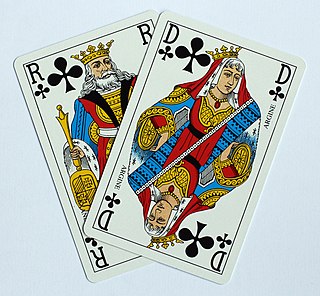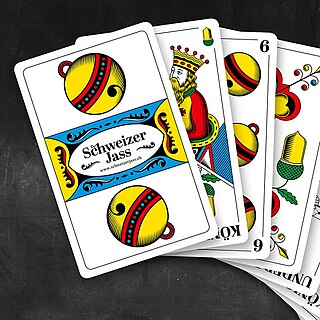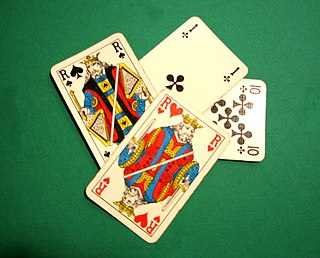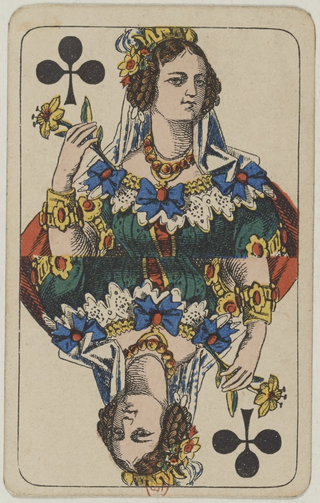
Pinochle, also called pinocle or penuchle, is a trick-taking ace–ten card game, typically for two to four players and played with a 48-card deck. It is derived from the card game bezique; players score points by trick-taking and also by forming combinations of characters into melds. It is thus considered part of a "trick-and-meld" category which also includes the game belote. Each hand is played in three phases: bidding, melds, and tricks. The standard game today is called "partnership auction pinochle".

Bezique or bésigue is a 19th-century French melding and trick-taking card game for two players that came to Britain and is still played today. The game is derived from piquet, possibly via marriage (sixty-six) and briscan, with additional scoring features, notably the peculiar liaison of the Q♠ and J♦ that is also a feature of pinochle, Binokel, and similarly named games that vary by country.

Euchre or eucre is a trick-taking card game commonly played in Australia, Canada, Great Britain, New Zealand, and the Midwestern United States. It is played with a deck of 24, 25, 28, or 32 standard playing cards. There are normally four players, two on each team, although there are variations for two to nine players.

Spades is a trick-taking card game devised in the United States in the 1930s. It can be played as either a partnership or solo/"cutthroat" game. The object is to take the number of tricks that were bid before play of the hand began. Spades is a descendant of the whist family of card games, which also includes bridge, hearts, and oh hell. Its major difference as compared to other whist variants is that, instead of trump being decided by the highest bidder or at random, the spade suit always trumps, hence the name.

Forty-fives is a trick-taking card game that originated in Ireland. The game is popular in many communities throughout Atlantic Canada as well as the Gaspé Coast in Québec. Forty-fives is also played in parts of Massachusetts and southern New Hampshire in New England, United States, as well as in the South Island of New Zealand.
Marjapussi is a traditional Finnish trick taking game for 4 players playing in 2 partnerships and is one of the Mariage family, its key feature being that the trump suit is determined in the middle of the play by declaring a marriage. There are variants of marjapussi for two and three players.

Belote is a 32-card, trick-taking, ace–ten game played primarily in France and certain European countries, namely Armenia, Belgium, Bulgaria, Croatia, Cyprus, Georgia, Greece, Luxembourg, Moldova, North Macedonia, Bosnia and Herzegovina and also in Saudi Arabia. It is one of the most popular card games in those countries, and the national card game of France, both casually and in gambling. It appeared around 1900 in France, and is a close relative of both Klaberjass and klaverjas. Closely related games are played throughout the world. Definitive rules of the game were first published in French in 1921.

Sixty-six or 66, sometimes known as Paderbörnern, is a fast 5- or 6-card point-trick game of the marriage type for 2–4 players, played with 24 cards. It is an ace–ten game where aces are high and tens rank second. It has been described as "one of the best two-handers ever devised".

Jass is a family of trick taking, ace–ten card games and, in its key forms, a distinctive branch of the marriage family. It is popular in its native Switzerland as well as the rest of the Alemannic German-speaking area of Europe, Italian South Tyrol and in a few places in Wisconsin, Ohio, California, Oregon and Washington USA.

Clabber is a four-player card game played in southwestern Indiana near Evansville. It is a member of the Jack–nine family of point-trick card games that are popular in Europe and is similar to Klaberjass. The trump makers must score at least eighty-two points to keep from "going set", where they don't score any of their points. Additional points can also be scored for a combination of cards in a hand, which would assist in "making it", or, not going set.
Ulti, or Ultimó, is Hungary's national trick-taking card game for three players. It is virtually unknown outside its home borders.

Twenty-eight is an Indian trick-taking card game for four players, in which the Jack and the nine are the highest cards in every suit, followed by ace and ten. It thought to be descended from the game 304, along with similar Indian games known as "29", "40" and "56".

Klaberjass or Bela is a trick-taking ace–ten card game that is most popular in German communities. In its basic form it is a 9-card trick-and-draw game for two players using a 32-card piquet pack.
Mariage or Mariagenspiel is a German 6-card trick-and-draw game for two players in which players score bonus points for the "marriage" of king and queen of the same suit. The game, first documented in 1715 in Leipzig, spawned numerous offshoots throughout continental Europe and gives its name to the marriage group of card games, the widest known of which is probably sixty-six. Many of these are still the national card games of their respective countries.

The following is a glossary of terms used in card games. Besides the terms listed here, there are thousands of common and uncommon slang terms. Terms in this glossary should not be game-specific, but apply to a wide range of card games played with non-proprietary packs. It should not include terms solely related to casino or banking games. For glossaries that relate primarily to one game or family of similar games, see Game-specific glossaries.

1000 is an easy-to-learn card game for two or three players. Its simple rules make it suitable for players to quickly become familiar with the basic concepts of trick-taking and trump-based card games. The name is taken from the score at the end of the game.

Binokel is a card game for two to eight players that originated in Switzerland as Binocle, but spread to the German state of Württemberg, where it is typically played with a Württemberg pattern pack. It is still popular in Württemberg, where it is usually played in groups of three or four as a family game rather than in the pubs. In three-hand games, each player competes for himself, while in four-hand games, known as Cross Binokel (Kreuzbinokel), two teams are formed with partners sitting opposite one another. The game was introduced to America by German immigrants in the first half of the 20th century, where it developed into the similar game of pinochle. Binocle was still played in Switzerland in 1994. In south Germany, the game is sometimes called by its Swabian name, Benoggl.

Briscan is an 18th-century, French ace–ten card game for two players played with a 32-card piquet pack. It is a member of the marriage group of games in which the 'marriage' of a king and queen brings a bonus score, but briscan takes this simple concept to extraordinary lengths.
Call-ace whist or Danish whist is a card game for four players playing in variable partnerships. It is the most popular form of Whist in Denmark, where it is often just called "Whist". It has a well developed bidding system and has imported from the traditional Danish game of Skærvindsel the feature of determining the partnerships by 'calling an ace'. John McLeod records that there is also a version of Danish whist in which there are fixed partnerships.

Sjavs is a Danish card game of the Schafkopf family that is played in two main variants. In Denmark, it is a 3-player game, played with a shortened pack of 20 cards; in the Faroe Islands, where it is very popular, it is a four-hand, partnership game using a standard piquet pack of 32 cards.














